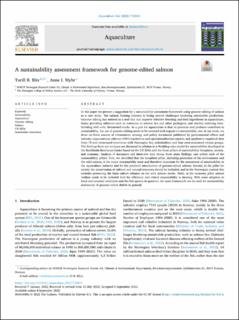A sustainability assessment framework for genome-edited salmon
Journal article, Peer reviewed
Published version
Permanent lenke
https://hdl.handle.net/11250/3018044Utgivelsesdato
2022Metadata
Vis full innførselSamlinger
Originalversjon
10.1016/j.aquaculture.2022.738803Sammendrag
In this paper we present a suggestion for a sustainability assessment framework using genome editing of salmon as a case study. The salmon farming industry is facing several challenges hindering sustainable production. Genome editing has entered as a tool that can improve selective breeding and feed ingredients in aquaculture, hence providing solutions such as resistance to salmon lice and other pathogens, and sterility reducing interbreeding with wild, threatened stocks. As a goal for aquaculture is that its practices and products contribute to sustainability, the use of genome editing needs to be assessed with regards to sustainability, too. In our work, we draw on three sources of information; strategy and policy documents published by governmental offices and industry organizations; relevant GMO regulations and operationalization reports; and qualitative empirical data from 19 semi-structured interviews with Norwegian key stakeholders, and four semi-structured citizen groups. The findings from our analyses are discussed in relation to a Wedding cake-model for sustainability developed at the Stockholm Resilience Centre based on the UN SDGs and the three pillars of sustainability: biosphere, society, and economy. Analysis of document and interview data shows three main findings, one within each of the sustainability pillars. First, we identified that the biosphere pillar, including protection of the environment and the wild salmon, is the major sustainability issue and therefore important for the assessment of sustainability in the aquaculture industry and for the potential introduction of genome-edited salmon. Second, in the pillar for society the preservation of cultural and natural resources should be included, and in the Norwegian context this includes preserving the Sámi culture reliance on the wild salmon stocks. Third, in the economy pillar animal welfare needs to be included both for efficiency and ethical responsibility in farming. With some adoption to local and national conditions and the fish species in question, the same framework can be used for sustainability assessment of genome edited finfish in general.

